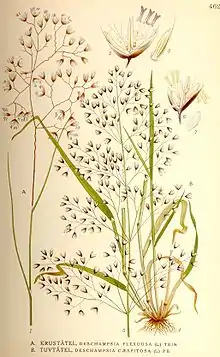| Deschampsia | |
|---|---|
 | |
| Deschampsia flexuosa (left) Deschampsia cespitosa (right)[1] | |
| Scientific classification | |
| Kingdom: | Plantae |
| Clade: | Tracheophytes |
| Clade: | Angiosperms |
| Clade: | Monocots |
| Clade: | Commelinids |
| Order: | Poales |
| Family: | Poaceae |
| Subfamily: | Pooideae |
| Supertribe: | Poodae |
| Tribe: | Poeae |
| Subtribe: | Aristaveninae F.Albers & Butzin |
| Genus: | Deschampsia P.Beauv.[2] |
| Type species | |
| Deschampsia cespitosa | |
| Synonyms[5] | |
| |
Deschampsia is a genus of plants in the grass family, commonly known as hair grass[6] or tussock grass. The genus is widespread across many countries.[7][8]
The genus is named for French physician and naturalist Louis Auguste Deschamps (1765–1842).[7][9]
Deschampsia species are used as food plants by the larvae of some species of Lepidoptera, including antler moth, the clay, clouded-bordered brindle, common wainscot, dark arches, dusky brocade, shoulder-striped wainscot, smoky wainscot and wall.
Deschampsia sometimes grow in boggy acidic formations, an example of which is the Portlethen Moss, Scotland. Deschampsia antarctica is the world's most southern monocot,[10][11] and one of only two flowering plants of Antarctica.[12][13]
Some species, such as D. cespitosa and D. flexuosa, are grown as ornamental garden plants.
Species
- Deschampsia airiformis (Steud.) Benth. & Hook.f. ex B.D.Jacks. – Chile, Argentina[5]
- Deschampsia angusta Stapf & C.E.Hubb. – Zaire, Kenya, Uganda
- Deschampsia antarctica E.Desv. – Chile, Argentina, Antarctica, Falkland Islands, South Georgia, Crozet Islands, Heard-McDonald Islands, Kerguelen Islands, South Sandwich Islands
- Deschampsia argentea Lowe – Azores, Madeira, Canary Islands
- Deschampsia atropurpurea (Wahlenb.) Scheele – northern Eurasia, North America, Chile, Argentina
- Deschampsia baicalensis Tzvelev – Irkutsk
- Deschampsia berteroniana (Kunth) F.Meigen – Chile, Argentina
- Deschampsia bottnica (Wahlenb.) Trin. – Kvarken Archipelago (part of Finland)
- Deschampsia cespitosa (L.) P.Beauv. – temperate, subarctic, and alpine regions in North America, Eurasia, Africa, Australia, various islands
- Deschampsia chapmanii Petrie – New Zealand incl Antipodes, Macquarie Islands
- Deschampsia christophersenii C.E.Hubb. – Tristan da Cunha
- Deschampsia cordillerarum Hauman – Chile, Argentina
- Deschampsia danthonioides (Trin.) Munro – Annual hairgrass – Alaska, Yukon, British Columbia, western USA, Mexico
- Deschampsia elongata (Hook.) Munro – Chile, Argentina, United States including Alaska, Canada, Mexico
- Deschampsia flexuosa (L.) Trin – Eurasia, alpine areas in Africa; northern North America, southern South America, Falkland Islands
- Deschampsia foliosa Hack. – Azores
- Deschampsia gracillima Kirk New Zealand including Antipodes, Tasmania
- Deschampsia kingii (Hook.f.) É.Desv. – Chile, Argentina
- Deschampsia klossii Ridl. – Lesser Sunda Islands, New Guinea
- Deschampsia koelerioides Regel – Siberia, Central Asia, China, Mongolia, Afghanistan, Pakistan
- Deschampsia laxa Phil. – Chile, Argentina
- Deschampsia leskovii Tzvelev – northern European Russia
- Deschampsia liebmanniana (E.Fourn.) Hitchc. – Mexico
- Deschampsia ligulata (Stapf) Henrard – Borneo
- Deschampsia looseriana Parodi – Chile
- Deschampsia maderensis (Hack. & Bornm.) Buschm. – Madeira
- Deschampsia media (Gouan) Roem. & Schult. – central and southern Europe, Morocco, Caucasus
- Deschampsia mejlandii C.E.Hubb. – Tristan da Cunha
- Deschampsia mendocina Parodi – Argentina
- †Deschampsia mexicana Scribn. – Mexico, apparently extinct
- Deschampsia mildbraedii Pilg. – Cameroon
- Deschampsia nubigena Hillebr. – Hawaii
- Deschampsia parvula (Hook.f.) É.Desv. – Chile, Argentina, Falkland Islands, Anvers Island
- Deschampsia patula (Phil.) Skottsb. – Chile, Argentina
- Deschampsia pusilla Petrie – New Zealand South Island
- Deschampsia robusta C.E.Hubb. – Tristan da Cunha
- Deschampsia setacea (Huds.) Hack. – northern and western Europe
- Deschampsia tenella Petrie – New Zealand
- Deschampsia venustula Parodi – Chile, Argentina
- Deschampsia wacei C.E.Hubb.- Tristan da Cunha
Formerly included
Deschampsia formerly included many species now placed in other genera, such as Aira, Antinoria, Bromus, Calamagrostis, Centropodia, Colpodium, Dissanthelium, Holcus, Periballia, Peyritschia, Poa, Trisetum and Vahlodea.[5]
References
- ↑ illustration circa 1920 from Bilder ur Nordens Flora by Carl Axel Magnus Lindman
- ↑ "Genus: Deschampsia P. Beauv". Germplasm Resources Information Network. United States Department of Agriculture. 1999-03-09. Archived from the original on 2011-07-21. Retrieved 2011-03-07.
- ↑ lectotype designated by Nash in N. L. Britton et A. Brown, Ill. Fl. N.U.S. ed. 2. 1: 215. 7 Jun (1913)
- ↑ Tropicos, Deschampsia P.Beauv.
- 1 2 3 "World Checklist of Selected Plant Families".
- ↑ "Deschampsia". Integrated Taxonomic Information System. Retrieved 2011-03-07.
- 1 2 Palisot de Beauvois, Ambroise Marie François Joseph. 1812. Essai d'une Nouvelle Agrostographie 91 descriptions in Latin, etymology explained in French
- ↑ Palisot de Beauvois, Ambroise Marie François Joseph. 1812. Essai d'une Nouvelle Agrostographie, plate XVIII (18) figure III (3) line drawing of Deschampsia cespitosa
- ↑ Jstor Deschamps, Louis Auguste (1765-1842)
- ↑ Young, Mark C., ed. (1955). Guinness Book of World Records 1997. Guinness Publishing Ltd. pp. 42. ISBN 0-9652383-0-X.
- ↑ Wali, Mohan K.; Evrendilek, Fatih; Fennessy, M. Siobhan (July 2009). The Environment: Science, Issues, and Solutions. CRC Press. p. 21. ISBN 978-1-4200-0733-6. Retrieved 25 Sep 2016.
- ↑ Smith, Ronald I.L.. 1984 Terrestrial plant biology of the sub-Antarctic and Antarctic. In: Laws, R.M., (ed.) Antarctic Ecology, vol. 1. London, Academic Press, 61-162.
- ↑ Holderegger, Rolf; Stehlik, Ivana; Lewis Smith, Ronald I.; Abbott, Richard J. (May 2003). "Populations of Antarctic Hairgrass (Deschampsia antarctica) Show Low Genetic Diversity". Arctic, Antarctic, and Alpine Research. 35 (2): 214–217. doi:10.1657/1523-0430(2003)035[0214:POAHDA]2.0.CO;2.